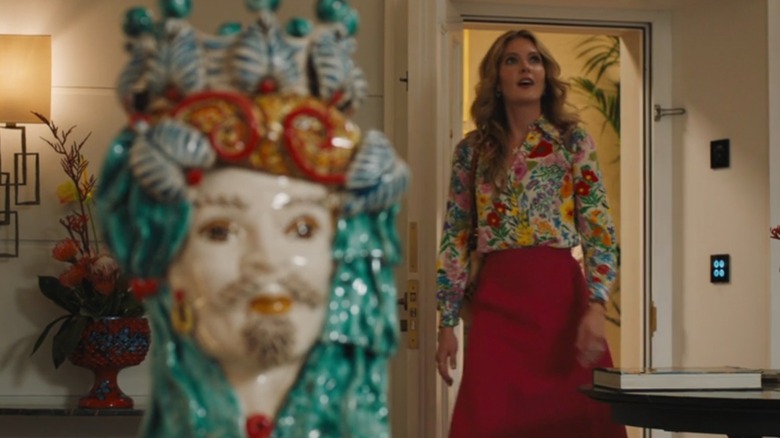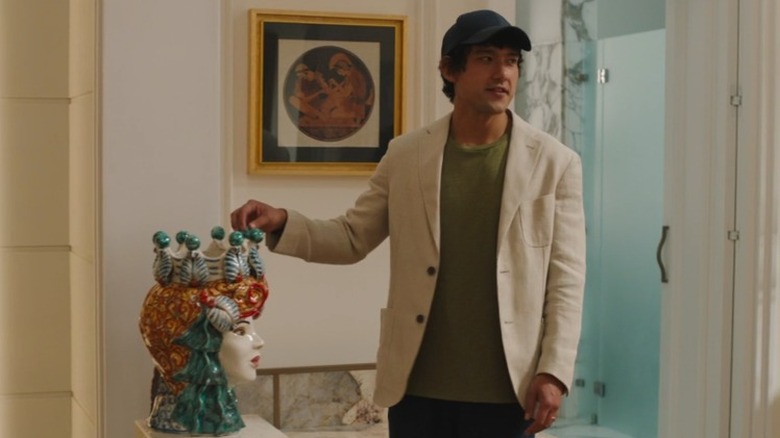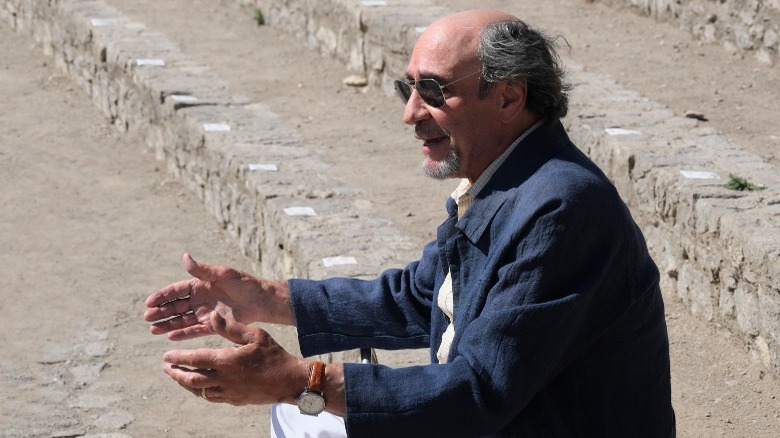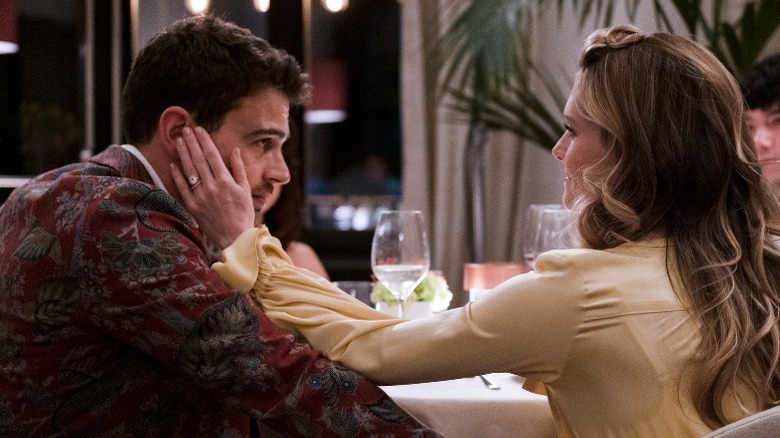What Are The Myths In The White Lotus Trying To Tell Us?
Mike White's "The White Lotus" loves to subvert our expectations, even as it plants the seeds for major moments along the way. Take, for example, the show's first season. When Murray Bartlett's Armond ended up dead in the hotel room of the hotel's most-loathed guest, Shane (Jake Lacy), it was a moment that felt both surprising and inevitable. After all, the pair had been at odds all season, and Armond had nothing left to lose after getting fired. It was a climax we could've guessed in broad strokes, if not in suitcase-pooping specifics. Yet other finale reveals — like the fact that newlywed Rachel (Alexandra Daddario) stood by Shane after his true, horrible nature was revealed — still hit like a gut punch.
White has a talent for crafting stories that feel at once totally in character and like narrative curveballs, so it's tough to guess how much the direct foreshadowing we've seen so far in the Sicily edition of "The White Lotus." Still, for two weeks in a row now, we've heard guests and staff members share surprisingly brutal myths about love and violence, and they're kind of hard to ignore. Could the myths and legends shared by Rocco (Frederico Ferrante) and Bert (F. Murray Abraham) be the key to the season's mystery? Or are these guys simply fools, talking confidently about things they don't know anything about? Let's investigate.
Testa di moro
The first legend we hear in Sicily comes moments after the guests arrive, as dysfunctional double daters Cameron (Theo James), Daphne (Meghann Fahy), Ethan (Will Sharpe), and Harper (Aubrey Plaza) are led to their adjoining suites. "Hey, what is with these head things?" Ethan asks concierge Rocco, resting his hand on a bust of a pale figure with a red and turquoise crown. There are two vases in this shot, a man and a woman, but Ethan says they're all over the hotel.
Rocco explains that these are Testa di moro, and shares the following story:
"The story is, a M**r came here a long time ago and seduced a local girl, but then she found out that he had a wife and children back home. So, because he lied to her, she cut his head off."
This is a real legend, one that is rooted in regional history and historical racism. The term Rocco uses was one Europeans gave to Black, Middle-Eastern, or Muslim peoples hundreds of years ago, according to Morocco World News. The term has also been used as a racial epithet, and although both statues pictured here are pale, Google searches for Testa di moro will inevitably return images of busts with representations of dark black skin, sometimes accompanied by caricature-like bright lips.
The Testa di moro legend is cited often on websites about Sicilian art and architecture, and Rocco's version of the story pretty much matches up with common retellings. One version, captured on the blog Scent of Sicily, dates the story's setting to around 1100, and described the eventual killer as a "beautiful girl with pink skin, like the colour of peach flowers in full blossoming." This version also asserts that she cut off her lover's head in his sleep.
Hades and Persephone
This isn't the only disturbing story we've heard so far since checking into The White Lotus. The season's second episode includes one that's even more messed up, largely because overly-flirty, elderly Bert retells it so cavalierly. His is the Greek myth of Hades and Persephone, and it comes up when he's goading his son, Dom (Michael Imperioli) about not telling Bert what he did to make his family so dang mad at him. Here's Bert's version of the story:
"Hades raped Persephone right here in Sicily. She was picking flowers and he burst through the earth and raped her. Well, that's what happened, he raped her. Then he dragged her down to the underworld. Demeter forgave Hades and he raped her daughter. I mean, whatever you've done can't be as bad as that. As Hades, and the raping."
This is a jarring moment for a few reasons, including the fact that Bert overuses the unsanitized word "rape" and that he compares the abduction story to Dom's presumably run-of-the-mill affair. It's a deceptively aggressive exchange, one that hints that Bert's personality isn't exactly that of a nice old man after all. Plus, oddly, he treats the Greek legend like a true story.
It's worth noting, though, that however callous Bert is here, he's also portraying a warts-and-all version of the Persephone story that many people gloss over. When I first heard the myth in elementary school, it was almost entirely focused on the pomegranate Hades gave Persephone, the seeds that counted the months she spent in the underworld, and the way her eventual return became a symbol of springtime. While Rocco's story ignores the tangled cultural roots of Testa di moro, Bert's focuses on the darkest parts of the Persephone myth. But what do they both mean?
These stories tie in to familiar themes
It's impossible not to see the connections between their themes and the guests at The White Lotus. Cheating and sexual misconduct seem to be two major recurring elements of this season, even if the former is much more overtly addressed than the latter. We know that Dom and Bert have both cheated, and that Cameron made a pass at Harper. We know that Greg (Jon Gries) answered a mysterious phone call that makes his hot-and-cold relationship with Tanya (Jennifer Coolidge) all the more unsteady. And, of course, we know that Lucia (Simona Tabasco) has no qualms about sleeping with married men.
While "The White Lotus" wears its fixation with infidelity on its sleeve, its commentary on consent has been a lot more subtle so far. The most telling reference to this topic came during a conversation between the two married couples, when Cameron waves away Harper's work as an employment lawyer, dismissing lawsuits against employers as frivolous. "I've been dealing with a bunch of bogus claims lately, everyone has," Cameron says. While he doesn't specify that they're related to sexual harassment, it seems likely.
Meanwhile, Bert is a bit of a lech, eager to flirt with the young women around him, and his son Dom hires Lucia despite seeming to feel some heavy shame about his past infidelities. Even the characters who make a point of not crossing boundaries do so with an intentionality that shows they've been molded by a culture of over-sexualization: Ethan hides his porn use, for example, while Albie (Adam DiMarco) is meek and overly-formal with women, admitting he feels trapped in a nice guy/bad boy dynamic — which, he probably doesn't realize, is a common incel talking point.
Foreshadowing, red herrings, or character insight?
With five more weeks to go until we know exactly who ended up dead in the Ionian Sea, it's up to us to decide whether to take the myths we hear on the show as foreshadowing, characterization, or compelling red herrings. Will Daphne embody the Testa di morro by punishing Cameron for crossing a line? Could Greg be hiding a secret family from Tanya? Is it possible that Dom did commit some sort of sexual violence that put him on the outs with his wife, rather than a simple affair?
Every option is possible, but it's just as possible that White wants us to focus not on what stories are being told, but how. Perhaps it's important that we know that the clientele of The White Lotus are the kind of people who would be tickled by a story about a beheading, or reverent of a myth about rape. Aside from Ethan's question about what the statues are meant to communicate, no one in either scenario asks any questions about the stories' context: they're ready to get on to the next part of their sun-drenched vacation.
Or maybe it just means Daphne is going to bludgeon Cameron with a Testa di moro bust. Probably not, but we can dream, right?




